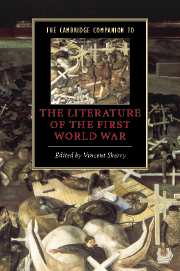Book contents
- Frontmatter
- Introduction
- Part I The Great War in British literary culture
- Part II The world war: Pan-European views, transatlantic prospects
- 6 The Great War and the European avant-garde
- 7 French writing of the Great War
- 8 The Great War and modern German memory
- 9 American writing of the Great War
- Part III Postwar engagements
- Guide to Further Reading
- Index
- Series List
8 - The Great War and modern German memory
from Part II - The world war: Pan-European views, transatlantic prospects
Published online by Cambridge University Press: 28 May 2006
- Frontmatter
- Introduction
- Part I The Great War in British literary culture
- Part II The world war: Pan-European views, transatlantic prospects
- 6 The Great War and the European avant-garde
- 7 French writing of the Great War
- 8 The Great War and modern German memory
- 9 American writing of the Great War
- Part III Postwar engagements
- Guide to Further Reading
- Index
- Series List
Summary
In an important sense all German literature after 1914 is literature written in the aftermath of the Great War, since it can be held to reflect the horror, despair, and doubtful glory of this event or else to have repressed it. This chapter has much to choose from among “war writings” and has selected those that are explicit in referring to the frontline experience of soldiers, along with other types of writing that arise in an acknowledged, immediate relation to the Great War, including the works of ideological writers, like Thomas Mann, who consider themselves, in Mann's phrase, “soldiers of ideas.”
The general reaction to the outbreak of war with Serbia, Russia, France, and England in the great cities of Germany and Austria was a display of enthusiasm in public places by massed crowds so huge as to have the power to draw all observers into their camp. Franz Kafka, for one, was swept along into the street crowds in Prague, in 1914 the capital of the Bohemian Lands of the Austro-Hungarian Empire; but what he afterwards marveled at was the crowd factor, the degree of cohesion, and less the substance of its giant yawp. All throughout Central Europe the weather that summer had been brilliant – unmatchably brilliant in recent memory; and so it is thinkable that if the weather had been foul, and the opportunity for crowds to exert pressure on their rulers less available, the foulness of the war might have been averted: historians like Reiner Stach and Modris Eksteins hold this view.
- Type
- Chapter
- Information
- The Cambridge Companion to the Literature of the First World War , pp. 191 - 216Publisher: Cambridge University PressPrint publication year: 2005
- 4
- Cited by



